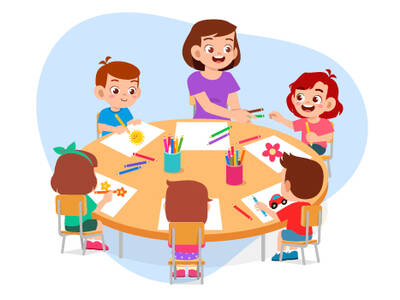
In Greece, the principle of equal treatment and gender equality is established by the 1975 Constitution. In particular, Article 4, paragraph 1 sets out a general principle of equality "Greeks are equal before the law". This constitutional principle is supplemented with regard to the relations of the two sexes in paragraph 2 of the same article as follows: "Greeks have equal rights and obligations." The revision of the 2001 Constitution incorporated a new wording, -Article 116 par. 2- which states “It is not discrimination on grounds of gender to take positive measures to promote equality between men and women. The state takes care to eliminate the inequalities that exist in practice, especially to the detriment of women ".
Article 16 of the 1975 Constitution establishes equality in the right to free education, at all levels of education for all nationals, regardless of gender. Moreover, "art and science, research and teaching are free, and their development and promotion is an obligation of the state."
The principle of gender equality was established by the 1975 Constitution, but with the country's entry into the EEC and especially during the period 1981-1989, it was founded with laws aimed at eliminating discrimination against women in all areas of social life. Laws on family, education, employment and social security were passed. Law 1286/82 abolished the last distinctions at the legislative level between students as well as the teaching staff. Law 1329/83 modernized Family Law and adapted it to the constitutional requirement of the principle of gender equality. According to this law the following was abolished: the concept of the patriarchal family in which the man was the of the family, and decided on everything related to marital life and was replaced by the family of equality in which man and woman decide on all matters of their marital and family life.
By law N.1342 / 1983 (Government Gazette 39 / A / 1983), the UN International Convention on the Elimination of All Forms of Discrimination against Women (CEDAW) was ratified without any reservation. The CEDAW Convention is recognized by international law and the governments of the countries that have ratified it are committed to implementing its articles.
In 1985, Law 1558/85 established the General Secretariat for Equality (GGI) as a competent public service for the promotion of formal and substantive equality between men and women in all sectors -political, social, economic and cultural- and to this day remains the governing body responsible for gender equality issues. In 1989 with Law 1835/89 initially and then with Law 2266/94, the Equality Research Center (KETHI) was founded in Athens and operates to this day. At the regional level, the prefectural organization of equality mechanisms was created, which includes the Prefectural Equality Committees with representatives of state, local bodies and women's organizations and the Prefectural Equality Offices for the better information of the citizens. Finally, in 2000, 13 Regional Equality Committees were established at the Regional level, chaired by the Secretary General of the Region∗.
From 1995 onwards, gender equality policy was gradually extended to a wide range of public policy areas as articulated at the UN Conference on Women in Action (1995). These include tackling gender-based violence and participating in decision-making centers, areas that have been constant priorities of public policy equality in Greece to date∗∗.
∗ Stratigaki Maria, "Gender Equality Policies in the Labor Market in the European Union and Greece", in "Gender and New Professions" of EPPEAEK II 2000-2006 "Production of Auxiliary educational material for the introduction of gender issues in the educational process », 2007, available here.
∗∗ Stratigaki
Measures - actions to address violence against women
The Istanbul Convention is the most comprehensive international human rights treaty on violence against women and domestic violence. Greece signed the Istanbul Convention in May 2011 and ratified it in April 2018. The treaty entered into force in October 2018, with law 4531/2018.
The Convention is important because it recognizes that women and girls are at higher risk of violence than men, recognizes in practice and in law gender equality (de facto & de jure) and condemns all forms of violence against women and children , like any form of gender-based violence. The Convention provides for the coordination and cooperation of the following competent bodies: the judiciary, the police, local and regional authorities, organizations for the protection and support of victims and witnesses. The implementation of the Convention by the states that have ratified it is monitored by the team of independent experts GREVIO and the first evaluation of the country is expected to be completed in 2023.
With Law 4604/2019, the first part of which is entitled "Promoting substantial gender equality, prevention and combating gender-based violence" (articles 1-30), an independent institutional framework for gender equality and the elimination of discrimination against women is enacted, for the first time, which is governed by a comprehensive view of gender relations and without treating women as a "special category", as in the case of today provisions and regulations of family and labor law, social security law, Community directives and international treaties, which our country has ratified or defined by our Constitution. It identifies the basic concepts, mechanisms and bodies for the implementation of the principle of equal treatment of the sexes, the integration of this principle in public policies and in private life, as well as the formation and organization of a network of permanent structures, by the country, with the object of preventing and tackling violence against women. For this purpose, the operation of an integrated Network of structures and services is envisaged with the object of offering psychosocial support, legal counseling, but also safe accommodation to women victims of gender-based violence. These are the structures that constitute the network of the General Secretariat for Family Policy and Gender Equality, the Women's Counseling Centers, the Shelters for women survivors of violence, the 24-hour nationwide telephone line SOS 15900. In addition, the Independent Offices are established in the KEDE and ENPE, the Equality Committees in the Municipalities and the Regional Equality Committees are upgraded.
The ECHR, National Action Plan for Gender Equality, includes a series of horizontal interventions across the range of public policy and vertical specialist policies aimed at women and men in areas where inequalities are identified. The combination of the two directions in the interventions follows the strategy for the promotion of gender equality, as established in 1995 at the UN Beijing Platform and the European Commission Communication on Gender Mainstreaming.
The priority axes of the NAPGE follow the guidelines of the European Commission to the Member States, adapting to the specific circumstances of Greece and concern the following policy areas:
- Social inclusion and equal treatment of women who are subject to multiple discrimination
- Gender-based violence
- Labor market and harmonization of family and professional life
- Education, training, culture, sports and media
- Health
- Decision making centers
The most recent development in the field of legislation is the enactment of Law 4491/2017 (Government Gazette A '152 / 13.10.2017) "Legal recognition of gender identity - National Mechanism for the Preparation, Monitoring and Evaluation of Action Plans for the Rights of the Child and other provisions », Which provides transgender people with the right to have their gender identity recognized as an element of their personality and the right to respect for their personality based on their gender characteristics. In 2016, Law 4443/2016 (Government Gazette A'232 / 9.12.2016) incorporates - among others, the Directives 2000/43 / EC on the application of the principle of equal treatment of persons regardless of their racial or ethnic origin, and 2000/78 / EC establishing a general framework for equal treatment in employment and occupation, strengthening the national institutional framework for equal treatment, replacing Law 3304/2005 (Government Gazette 16 / A / 27-01-2005) “Application of the principle of equal treatment regardless of racial or ethnic origin, religion or other beliefs, disability, age or sexual orientation ”and reinforcing pre-existing provisions of other relevant Laws17. Article 2 of the Law includes definitions for concepts such as: "direct discrimination" 18, "indirect discrimination" 19, "harassment" 20, "discrimination due to relationship" 21, "discrimination due to alleged characteristics" 22, "multiple discrimination" 23. a. According to this Law, the principle of equal treatment regardless of race, color, national or ethnic origin, pedigree, religious or other beliefs, disability or chronic illness, age, family or social status.
The promotion of gender equality is not an issue that concerns only women: it concerns both men and society in all its forms and touches every aspect of our lives. Gender equality can be the starting point for progress, pluralism and democracy, by building equal cooperation between men and women. The legal framework that exists today in Greece is considered one of the most advanced. But it is not enough on its own to solve problems and ensure gender equality. Gender discrimination in society shows that gender equality has not yet been achieved. It is therefore necessary to integrate the gender dimension in all policies and the implementation of special measures or positive actions for prevention.
With the Presidential Decree 3 / 6-1-2021, «Article 2 - Renaming of the General Secretariat of the Ministry of Labor and Social Affairs ", the General Secretariat for Family Policy and Gender Equality of par. 3 of article 7 of p.d. 84/2019 (Α '123) is renamed to General Secretariat of Demographic and Family Policy and Gender Equality and the corresponding position of General Secretary of Family Policy and Gender Equality to position of General Secretary of Demographic and Family Policy and Gender Equality, with whatever consequences this may to have in the future.
Related Articles
The Kindergarten is the first official educational institution for children. The children arrive at the Kindergarten having…
In Greece, in 1979, the procedures for the institutionalization of mixed education began, which, however, was finalized in…
The first contact with the stereotypes of classic fairy tales took place in early 2019, after the fairy tales had been selected.…
Children through their family, the dominant body of socialization, acquire their gender identity through the imitation of…









